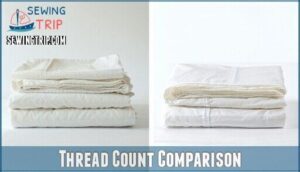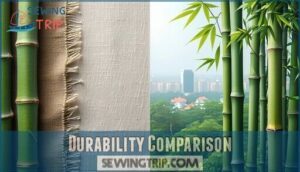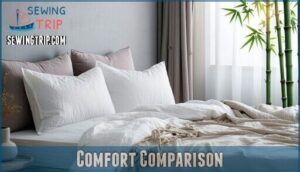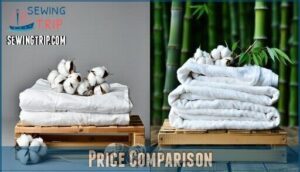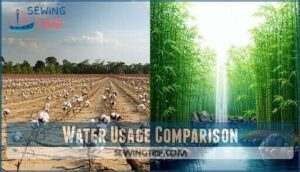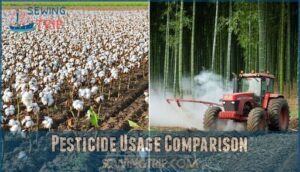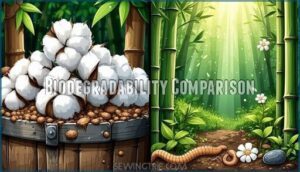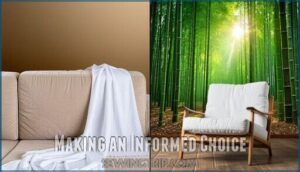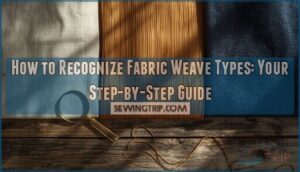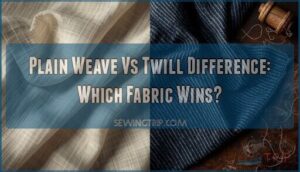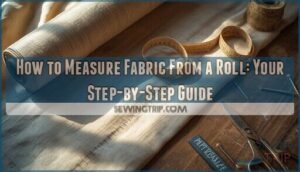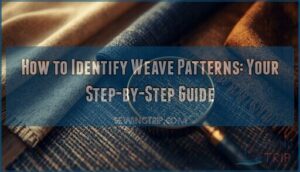This site is supported by our readers. We may earn a commission, at no cost to you, if you purchase through links.
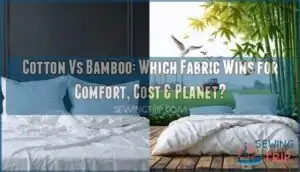
Cotton offers that classic, crisp feel you know well – it’s durable, affordable, and available everywhere.
Bamboo sheets feel silkier from day one, naturally resist bacteria and odors, and keep you cooler at night.
Cotton wins on price and familiarity, while bamboo excels in eco-friendliness (using 70% less water to grow) and natural temperature regulation.
Your sensitive skin might prefer bamboo’s hypoallergenic properties, but cotton’s proven longevity appeals to budget-conscious shoppers.
The real decision factors might surprise you, considering classic feel and natural temperature regulation.
Table Of Contents
Key Takeaways
- You’ll get better durability and affordability with cotton sheets, which typically last 2-3 years and cost $30-70 per set, making them ideal if you’re budget-conscious and want proven longevity.
- You’ll experience superior comfort and health benefits with bamboo sheets thanks to their natural antimicrobial properties, hypoallergenic nature, and silky texture that improves over time.
- You’ll make a more eco-friendly choice with bamboo, which uses 70% less water to grow, requires no pesticides, and has a significantly lower carbon footprint compared to cotton’s heavy chemical and water requirements.
- You’ll need to weigh upfront costs versus long-term value – bamboo costs 20-50% more initially ($50-120 per set) but often lasts 5-15 years, potentially offering better cost-effectiveness over time.
Cotton Vs Bamboo Basics
When you’re comparing cotton and bamboo fabrics, understanding their origins and processing methods helps you make smarter purchasing decisions.
Both materials follow distinct paths from plant to fabric, with cotton’s centuries-old history contrasting bamboo’s modern textile applications.
History of Cotton
When ancient civilizations discovered cotton around 5,000 BCE, they discovered textile history’s most revolutionary fiber.
You’ll find cotton origins traced from India’s Indus Valley to Egypt’s Nile, where ancient cotton cultivation transformed global trade networks forever.
| Era | Development | Impact | Innovation |
|---|---|---|---|
| 2500 BCE | Ancient Cotton cultivation begins | Cotton textiles enter trade | Hand spinning/weaving |
| 1793 CE | Cotton Gin invention | Cotton production explodes | 50% labor reduction |
| 1800s | Industrial Revolution peak | Global textile dominance | Mechanized processing |
| Modern | Organic cotton production | Sustainable alternatives | GM cotton varieties |
The cotton gin revolutionized everything, making cotton fibers accessible worldwide.
Today’s cotton production sustains millions globally.
History of Bamboo
While cotton’s story spans millennia, bamboo’s journey began around 5,000 BCE in China.
You’ll find bamboo origins deeply rooted in ancient uses – from building materials to daily tools.
Historical significance grew as bamboo trade spread through Asia, with over 1,500 species documented by the 19th century.
Bamboo cultivation expanded globally, showcasing bamboo benefits and sustainability through its remarkable bamboo properties and versatile bamboo fibers.
| Era | Bamboo Development |
|---|---|
| 5,000 BCE | First recorded use in China for construction |
| 794-1185 CE | Japanese artisans create bamboo accessories |
| 618-907 CE | Tang Dynasty uses bamboo for paper production |
| 1860s | French engineers employ bamboo in bridge construction |
| 1990s | Chemical spinning creates smooth bamboo textile fibers |
Cotton Fiber Processing
From harvest to fabric, cotton fiber processing transforms raw bolls into textile-ready materials through precise steps. The ginning process separates lint from seeds with 98% efficiency, while carding aligns fibers for spinning.
Different cotton types require specific handling—long-staple varieties need gentler processing than short-staple versions. Fiber classification determines spinning methods, with combed yarns gaining 15-20% more strength than carded versions.
| Processing Stage | Purpose | Efficiency Rate |
|---|---|---|
| Ginning | Seed removal | 98% separation |
| Carding | Fiber alignment | 85-90% yield |
| Spinning | Yarn formation | 60% ring spinning |
Modern textile manufacturing processes up to 12,000 bales daily, ensuring consistent fiber production for various cotton processing applications, which involves precise steps and requires specific handling to produce high-quality textile-ready materials with high efficiency rates.
Bamboo Fiber Processing
Manufacturing bamboo’s journey into fabric relies on two distinct methods that dramatically shape the final product’s characteristics. You’ll encounter mechanical harvesting that crushes bamboo stalks using natural enzymes, creating coarser bamboo linen with authentic texture.
| Processing Method | Chemical Use | Fiber Length | Environmental Impact | Texture Quality |
|---|---|---|---|---|
| Mechanical | Natural enzymes only | Under 50mm | Minimal impact | Coarse, authentic |
| Chemical Viscose | Sodium hydroxide, carbon disulfide | Up to 1,500 meters | Higher impact without closed-loop | Silky, soft |
| Bamboo Lyocell | Eco-friendly solvents | 800-1,200 meters | Lower impact | Premium softness |
| Bamboo Spinning | Varies by method | Depends on source | Method-dependent | Blended outcomes |
| Textile Finishing | Treatment chemicals | Post-process | Moderate impact | Enhanced properties |
Chemical bamboo processing creates longer fibers with superior tensile strength, enabling blends with cotton and polyester. However, eco processing through closed-loop systems recovers 99.5% of chemicals, addressing bamboo sustainability concerns. Natural fibers from mechanical extraction retain plant lignins, producing ecofriendly fabrics with authentic bamboo characteristics.
Fiber extraction methods determine whether you’ll get premium softness or rugged durability in your finished textile. Choosing sustainable fabric options, such as sustainable materials, is essential for reducing environmental impact and promoting eco-friendly fashion practices.
Sheet Material Comparison
When you’re choosing between cotton and bamboo sheets, you need to understand how these materials perform in real-world use.
The differences in thread count, durability, comfort, and price directly affect your sleep quality and wallet.
Thread Count Comparison
When comparing thread count between cotton vs bamboo sheets, you’ll find significant differences in weave density and fabric softness.
Cotton sheets typically range from 200-800 thread count, while bamboo fibers naturally achieve silky texture at lower counts of 200-400.
Understanding thread material types is essential for determining the overall quality and durability of the fabric.
| Aspect | Cotton | Bamboo |
|---|---|---|
| Thread Count Range | 200-800+ | 200-400 |
| Fiber Strength | Varies by quality | Naturally strong |
| Yarn Quality Impact | High thread count crucial | Less dependent |
| Thread Durability | Quality over quantity matters | Consistent performance |
Durability Comparison
Your fabric choice’s longevity depends on fiber structure and care.
The right fabric choice transforms sleep quality through smart material selection.
Bamboo sheets typically outlast cotton options, lasting 5-15 years versus cotton’s 2-3 years.
Premium cottons like Egyptian match bamboo’s durability but cost more upfront.
| Durability Factor | Bamboo | Cotton |
|---|---|---|
| Average Lifespan | 5-15 years | 2-3 years (10-15 premium) |
| Pilling Resistance | Excellent | Poor to Good |
| Tear Resistance | High | Variable |
| Fade Resistance | Superior | Moderate |
| Softness Over Time | Improves | Decreases |
Bamboo’s dense fiber structure provides superior wear resistance and material degradation protection.
Cotton durability varies markedly by fiber length – short-staple cotton shows visible wear quickly, while long-staple varieties offer better textile durability.
Fabric strength testing reveals bamboo maintains integrity longer, making it ideal for those seeking lasting fiber longevity without frequent replacements.
The eco friendly bamboo fabric options are also a key consideration for many consumers.
Comfort Comparison
Soft cotton sheets feel smooth against your skin, while bamboo offers naturally silky texture.
Both fabrics provide excellent comfort, but bamboo wins in moisture absorption and thermal regulation. Cotton’s durability means consistent softness levels over time, though bamboo’s breathability keeps you cooler during sleep.
Bamboo sheets have superior bamboo sheet benefits that make them a popular choice for bedding.
| Comfort Factor | Cotton Comfort | Bamboo Comfort |
|---|---|---|
| Softness Levels | Naturally soft, improves with washing | Silky smooth, luxurious feel |
| Breathability | Good airflow, moderate cooling | Superior ventilation, stays cool |
| Moisture Absorption | High absorption, slower drying | Excellent wicking, quick-dry |
| Fabric Feel | Classic cotton texture, familiar | Smooth, almost silk-like touch |
Price Comparison
Budget-conscious shoppers face different realities when comparing cotton vs bamboo pricing.
Production costs and labor expenses directly impact your wallet, with bamboo sheets typically costing 20-50% more upfront than cotton alternatives.
| Factor | Cotton | Bamboo |
|---|---|---|
| Initial Cost | $30-80 per set | $50-120 per set |
| Market Rates | Stable, predictable | Higher, fluctuating |
| Wholesale Prices | Lower production costs | Premium material fees |
| Cost-effectiveness | Budget-friendly option | Long-term investment |
| Textile Production | Established, efficient | Newer, specialized process |
Environmental Impact Analysis
When comparing fabric choices, you’ll want to understand how your decision affects the planet’s future.
Cotton and bamboo production create vastly different environmental footprints that impact water resources, soil health, and atmospheric carbon levels.
Water Usage Comparison
Your water usage matters when choosing sheets. Cotton requires 2,700 liters per t-shirt compared to bamboo’s 200-300 liters.
This crop comparison shows bamboo’s superior water conservation through efficient irrigation methods. Cotton demands heavy irrigation, creating resource management challenges, while bamboo thrives on rainfall alone.
These sustainability metrics highlight bamboo sustainability over cotton sustainability for eco-friendly materials selection. In addition, understanding the eco friendly textiles can help consumers make informed decisions about their fabric choices.
Pesticide Usage Comparison
Everyone knows conventional cotton production demands heavy chemical intervention, while bamboo naturally resists pests.
Here’s what you need to keep in mind when choosing between these materials for your bedding:
- Chemical Residue: Conventional cotton production uses approximately 24% of global insecticide sales, potentially leaving traces in finished products
- Toxic Exposure: Cotton farmers experience 85% skin irritation rates and 89% neurological effects from pesticide use
- Pest Control: Bamboo sustainability shines with natural resistance requiring minimal or no synthetic pesticides
- Eco Friendly: Bamboo cultivation operates without chemical treatments, protecting soil health and water systems
- Organic Methods: Cotton sustainability improves through organic farming, though pesticide reduction remains challenging for conventional production
The ecological impact difference is stark – bamboo’s natural defenses eliminate the need for the 200,000 tonnes of pesticides used annually in cotton farming worldwide.
Biodegradability Comparison
Both cotton and bamboo textiles offer impressive biodegradable properties for sustainable materials.
Natural cotton fibers decompose in 1-5 months under composting conditions, while bamboo achieves similar decomposition rates in 1-4 months.
Chemical treatments can extend bamboo’s breakdown to 4-8 months, but both substantially outperform synthetic alternatives.
When comparing cotton vs bamboo comparison for waste management, both create minimal eco impact and enrich soil post-decomposition, making them excellent ecofriendly materials choices, with a significant reduction in waste due to their sustainable nature.
Carbon Footprint Comparison
Regarding emissions and environmental impact, bamboo’s carbon footprint substantially outperforms cotton’s.
Here’s the breakdown:
- Emission Rates: Bamboo produces 1.15kg CO2e per kg fiber, while cotton ranges from 1.15-7.48kg CO2e per kg
- Carbon Offset: Bamboo sequesters 350% more carbon than cotton per hectare through rapid growth
- Energy Consumption: Bamboo requires less water and energy during textile production processes
- Greenhouse Gases: Global cotton production emits 63 million tonnes CO2e yearly versus bamboo’s net-negative emissions
- Sustainability Metrics: One bamboo acre absorbs 10,000lbs CO2 annually, making it superior for ecofriendly materials
The comparison highlights the significant environmental benefits of bamboo over cotton, demonstrating its potential as a more sustainable material option.
Skin and Health Considerations
Your skin deserves fabrics that won’t cause irritation, allergic reactions, or uncomfortable nights of tossing and turning.
When choosing between cotton and bamboo sheets, understanding how each material affects your skin and health can make the difference between restful sleep and restless nights.
Skin Irritation Comparison
Skin sensitivity matters when choosing fabrics.
Bamboo’s smooth fibers create less friction against skin compared to cotton’s coarser texture, reducing mechanical irritation.
Its superior moisture absorption keeps skin drier, preventing sweat-related flare-ups.
Bamboo’s natural hypoallergenic properties minimize irritation causes, while cotton can harbor bacteria.
Dermatological effects show bamboo offers better skin comfort through enhanced breathability and natural antimicrobial protection.
Allergy Comparison
Regarding allergic reactions, bamboo fibers emerge as natural hypoallergenic materials that rarely trigger immune responses.
You’ll find bamboo naturally resistant to dust mites and mold, while cotton requires chemical treatment for similar protection.
Here’s why bamboo wins the allergy battle:
- Contains "bamboo kun" bio-agent providing natural antimicrobial protection
- Clinical studies show extremely rare allergic reactions to pure bamboo fibers
- Naturally hypoallergenic properties reduce skin sensitivity triggers
- Blocks dust mites more effectively than untreated cotton
- Maintains germ-fighting effectiveness through multiple wash cycles
For those with respiratory issues or severe skin sensitivity, bamboo’s inherent properties create cleaner sleep environments without chemical additives that cotton often requires.
Breathability Comparison
Your body needs proper air circulation during sleep, and fabric choice directly impacts how well you breathe through the night.
Sleep quality starts with choosing fabrics that work with your body, not against it.
Cotton’s looser weave naturally allows better air flow between fibers compared to bamboo’s denser fabric structure. This creates superior thermal regulation with cotton sheets.
While both qualify as breathable materials, cotton’s open fiber arrangement promotes more effective moisture control, keeping you cooler and more comfortable throughout sleep cycles.
Understanding the importance of moisture wicking properties is essential for selecting the best fabric for comfort and health considerations.
Moisture Absorption Comparison
Moisture absorption varies dramatically between cotton and bamboo fabrics, affecting your sleep comfort.
Cotton properties include excellent absorbency rates, retaining up to 25 times its weight in moisture through fiber retention mechanisms.
Bamboo fabric outperforms cotton with superior water wicking capabilities, moving moisture away from skin faster.
Breathability tests consistently show bamboo’s enhanced moisture management compared to natural fibers like cotton, demonstrating its moisture management capabilities.
Making an Informed Choice
When you’re choosing between cotton and bamboo textiles, you’ll want to weigh several key factors that match your specific needs and values.
Your decision should balance comfort preferences, budget constraints, environmental priorities, and long-term durability expectations to find the best fit for your lifestyle, considering complete concepts that align with your needs.
Factors to Consider
When choosing between cotton fabric and bamboo fabric, you’ll need to weigh several key factors.
Consider your budget first—cotton typically costs less upfront, while bamboo offers long-term value.
Evaluate fabric care requirements, as both natural fibers need different maintenance approaches.
Sustainability matters for eco-conscious consumers seeking sustainable fabrics.
Assess eco benefits like water usage and pesticide impact.
Your consumer choice ultimately depends on balancing comfort, durability, and environmental priorities in this fabric comparison.
Understanding the benefits of bamboo fabric can help make a more informed decision.
Personal Preferences
Your personal style influences fabric choices beyond technical specs.
Some people love cotton’s classic feel and familiar texture, while others prefer bamboo’s silky-smooth touch.
Consider your skin sensitivity – bamboo clothing offers natural antimicrobial properties that cotton lacks.
Think about color options too; cotton holds dyes well, giving you vibrant choices.
Fabric softness and breathability matter for comfort.
Natural fiber enthusiasts often gravitate toward one material’s unique characteristics over the other.
When evaluating fabrics, consider the importance of sustainable fabric options to reduce environmental impact.
Budget Comparison
Your budget planning starts with upfront costs: cotton sheets average $30-70 per queen set, while bamboo ranges $45-120.
However, expense comparison reveals bamboo’s superior value over time.
Cotton requires replacement every 1-3 years, creating annualized costs of $20-65.
Bamboo’s 3-5 year lifespan drops annual expenses to $18-40, delivering significant financial savings despite higher initial cotton vs bamboo pricing differences.
Long-Term Benefits Comparison
Beyond upfront costs, you’ll want to weigh long-term value. Natural fiber durability, cost effectiveness over time, and environmental impact shape your textile sustainability investment.
Consider these key sustainability factors:
- Bamboo’s Resource Usage: Requires 70% less water than cotton, making it more environmentally friendly for long-term cultivation
- Cotton’s Durability Comparison: Traditional cotton offers proven longevity with proper care, potentially lasting decades
- Eco Impact Timeline: Bamboo biodegrades faster, reducing landfill burden compared to synthetic alternatives
- Cost Effectiveness Cycles: Initial bamboo premium may balance out through reduced replacement frequency
- Sustainability Benefits: Both natural fibers support ecofriendly textile choices over synthetic materials long-term
Both natural fibers have distinct advantages, but they share a common trait of being more sustainable than synthetic materials.
Frequently Asked Questions (FAQs)
Is bamboo or cotton better for your skin?
Bamboo fabric offers superior skin benefits compared to cotton.
It’s naturally antibacterial, hypoallergenic, and moisture-wicking, making it gentler for sensitive skin.
Bamboo’s smoother fibers reduce irritation while providing better temperature regulation for your comfort.
What is the downside of bamboo fabric?
Hold your horses before you jump in—bamboo fabric can pill easily, sometimes feels rough after washing, and may use chemicals during processing.
Always check for certified organic options to keep your skin safe and sound.
Is bamboo or cotton better for sweat?
For managing sweat, you’ll find bamboo fabric outperforms cotton substantially. Bamboo’s natural moisture-wicking properties and superior breathability keep you drier and more comfortable during physical activity than cotton’s absorbent nature.
What fabric is better than bamboo?
If you want something softer and more durable, try Pima or Egyptian cotton.
They’re perfect if you crave comfort, breathability, and a touch of luxury.
These long-staple cottons feel like sleeping on a cloud and last ages.
Which fabric lasts longer in bedding applications?
Like ye olde linens of medieval times, cotton bedding typically outlasts bamboo sheets.
Cotton’s cellular structure resists wear better, while bamboo fibers break down faster with frequent washing, making cotton your go-to choice for longevity.
How do washing requirements differ between materials?
Cotton requires gentle care with cool water and low heat to prevent shrinkage.
You’ll find bamboo more forgiving—it handles warm water better and dries faster without losing its softness or shape.
What are the color retention differences?
Dye absorption varies substantially between these materials.
Cotton’s natural fiber structure holds dyes better, maintaining vibrant colors longer through multiple washes.
Bamboo fabric tends to fade faster, especially with darker colors and frequent laundering cycles, which affects its ability to maintain darker colors.
Which performs better in humid climates?
You’ll stay cooler and drier with bamboo in humid climates since it wicks away moisture fast and breathes better.
Cotton can feel heavier and hold sweat, making you feel sticky—like wearing a wet towel on a summer hike.
How do manufacturing processes affect final quality?
Manufacturing processes dramatically impact fabric quality – you’ll find bamboo’s chemical processing can weaken fibers, while cotton’s mechanical spinning preserves strength. Ring-spun cotton creates smoother, stronger threads than rotor-spun alternatives.
Conclusion
Surprisingly, the cotton vs bamboo debate mirrors nature’s own efficiency lessons.
Cotton’s traditional reliability meets bamboo’s innovative sustainability in a fascinating textile showdown.
Your choice depends on priorities: cotton delivers proven durability and affordability, while bamboo offers superior moisture-wicking, antimicrobial properties, and environmental benefits.
Consider your skin sensitivity, budget constraints, and environmental values.
Neither fabric is universally superior—cotton excels for budget-conscious buyers seeking longevity, while bamboo suits eco-minded consumers prioritizing comfort and health benefits.
- https://ecoboo.net/blogs/green-clean/bamboo-vs-cotton-a-comprehensive-comparison-in-sustainability
- https://youbamboo.com/blogs/youbamboo/bamboo-vs-cotton-environmental-impact-and-sustainable-choices
- https://freeflyapparel.com/blogs/guide-post/bamboo-vs-cotton-fabric
- https://bamboo-haus.com/how-durable-is-bamboo-fabric-compared-to-others/
- https://elbertwipes.com/bamboo-vs-cotton-towels-which-truly-wins-on-eco-performance/

